Caution, Peligro!
SAN JOSE, LIBERIA & QUEPOS, August 24-September 1: COSTA RICA
SAN JOSE, August 24-26:
Leah: After moving
on from Ciudad Colon and our cush house-sitting gig, we trekked back into San
Jose--the suburb of Moravia to be exact--where we bedded down with our Couchsurfing
host, Carlos, and his precious two dogs. A Tico himself, Carlos is in his late
30s and was formerly married to an American; this lifestyle combination meant
he was completely at ease both discussing his favorite states to visit in the
US and his thoughts on the ending to Lost, as well as explaining Costa Rica’s
history, politics and cultural aspects. We arrived late afternoon and passed a
few hours in the typical Couchsurfing getting-to-know-you banter, after which
he left us to tuck in early for our forthcoming white-water rafting adventure
while he met up across town with some college buddies.
Steve and I had decided that rafting would be our splurge
activity in Costa Rica—he had never done it before and it had been years for
me. To top it off, our friend Sharon of Finca Saramandaia fame told us that
several of her Tico friends had worked for tourism companies in the past
specializing in zip lining. Disconcertingly, these friends shared with her
(after quitting) that some of these tour companies participate in highly unscrupulous
practices like maintaining resident wildlife (monkeys, sloths, etc.), which
they then tie to trees while the zip-lining tours occur. The tourists then
“see” the animals they’re promised (without knowing they’re not wild because the
ropes look like vines when you’re flying through the trees), the company makes
a profit and everyone goes home happy. We decided we didn’t want to be a part
of any of that; we chose rafting instead, which also alleviated our
environmental impact guilt. Apparently the combined voice and volume of those
involved in the rafting industry--companies and tourists--have prevented the
government from damming whole chunks of river and therefore flooding several
indigenous settlements. Therefore we gratefully collapsed in Jose’s upstairs
loft and awaited our forthcoming aqua escapades.
We arose just as a creamsicle dawn illuminated the
surrounding city and volcanoes in the distance. We had to make it to the hotel
where we’d be picked up by the Rios Tropicales shuttle to start our all day
(class III and IV rapids) adventure on the Rio Pacuare, apparently the #5 rafting
destination in the world (right after the Colorado River in my home turf). After
a 2 hour ride the team served up a filling and tasty breakfast at their
headquarters, where I also ran into a family from Eagle, Colorado, a tiny
little town in the Rocky Mountains where one of my besties hails from. Small
world indeed. From there we all bundled into vans to the put-in location about
45 minutes away, viewing a break in the roadside brush on the way out where a
petrol truck had overshot a turn and hurled off the mountain (the driver lived,
but yikes nonetheless) as our guide gave us safety briefing and the 53 things
to remember should you find yourself in the frothy turbulent water instead of
the rubber boat.
Once at the river we donned our helmets and lifejackets and
grabbed our paddles before jumping into our assigned boat with Ricardo, our
guide. The other 4 people in the boat were from Spain and Mexico, so Steve and I
enthusiastically nodded our consent in response to the guide’s question as to
if he could run the entire 5 hour expedition in Spanish…and then a couple of
non-Spanish speaking Americans were added to our boat and that went out the
window. Major bummer. But off we went, navigating the aesthetically incredible twists
and turns of the Rio Pacuare to Ricardo’s cries of “secure your feet!” right
before we hit rapids and the more emphatic, tension-filled version of “everyone
GET DOWN” when it got really rough and we all had to dive from our paddling
positions on the sides to a crouch position in the middle of the boat to avoid
being ejected. On the stretches of calm between the raging waters we were able
to see incredible birds of all varieties, rainbow-hued plants and flowers and
even a pulley system strung across the river with a hanging basket underneath
that the indigenous residents use to traverse the water. The water was
refreshingly cold, although it turned abrasively so when walls of it came
crashing over the front as we paddled like our lives depended on it.
One of my favorite sections was a fairly long stretch through a canyon with a quick current, deep water and no rapids--we all jumped overboard and floated on our backs, staring at the clouds and reveling in the pristine, cooling waters that carried us along. I was in my happy place, completed blissed out and so thankful that we had decided to do this. After over 4 hours of both fast and furious and languorous paddling, Ricardo delivered us safely to the ending location, unscathed and having never fallen out (although one of the others boats completely flipped over and it was pell-mell crazy for a bit as they tried to right the boat, collect all passengers and retrieve paddles). We enjoyed a tasty lunch and bundled back into the shuttle for a wet ride through the daily afternoon downpour back to San Jose, where we then caught the bus to Carlos’s house. Tired and sore, we spent a final evening with our knowledgeable host as he showed us pictures of San Jose centuries ago and passed along recommendations for the rest of our time in CR. (Steve: I'm still working on getting pictures of the rafting trip...a link to photos was rather pricey but I'm waiting to hear if the company will cut me a deal.)
One of my favorite sections was a fairly long stretch through a canyon with a quick current, deep water and no rapids--we all jumped overboard and floated on our backs, staring at the clouds and reveling in the pristine, cooling waters that carried us along. I was in my happy place, completed blissed out and so thankful that we had decided to do this. After over 4 hours of both fast and furious and languorous paddling, Ricardo delivered us safely to the ending location, unscathed and having never fallen out (although one of the others boats completely flipped over and it was pell-mell crazy for a bit as they tried to right the boat, collect all passengers and retrieve paddles). We enjoyed a tasty lunch and bundled back into the shuttle for a wet ride through the daily afternoon downpour back to San Jose, where we then caught the bus to Carlos’s house. Tired and sore, we spent a final evening with our knowledgeable host as he showed us pictures of San Jose centuries ago and passed along recommendations for the rest of our time in CR. (Steve: I'm still working on getting pictures of the rafting trip...a link to photos was rather pricey but I'm waiting to hear if the company will cut me a deal.)
LIBERIA, August 26-29:
From Morovia we headed back to San Jose to catch a bus to
Liberia, the provincial capital of Guanacaste about 30 minutes from the
Nicaraguan border. Just over 4 hours from San Jose, Liberia is the epitome of
dignified rural life, with wide rolling plains and muted colors; the region
used to be famous for its cowboy culture, but that has more of less died out.
We stayed in Hotel Liberia ($10/person for a dorm) for our first night and spent a few hours strolling
through the locked-up town (it was Sunday and most everything was closed)
before finding a pizza parlor for dinner with crappy dubbed American movies playing
in loop. The next day we caught a bus to take us about 15 minutes outside of
Liberia, where our next Couchsurfing host, Eugenia, Or “Eu”, awaited to welcome
us for a few nights—she was such a ball of vivacious energy and life!
Currently in her early 30s, Eu had worked for over 4 years
at the Four Seasons hotel in Guanacaste; she’s quite worldly, speaks impeccable
English and definitely shares our love of travel and wandering. She’s currently
the sales rep for, and living in, a mixed-use residential and commercial area
right across from the Liberia airport called Solarium. Everything was going as
planned until the economy tanked and potential investors, tenants and business
owners dried up, leaving Solarium as an empty shell standing alone on the road
from Liberia to the beach 20 minutes away. It’s beautiful, modern and brand-new
(Eu’s loft apartment was quite swanky), but everything almost seemed
apocalyptical, especially once night descended. The first night Steve and I
whipped up some eggs, beans and tortillas while Eugenia engaged in a culinary
experiment of dumping a can of tuna, some capers and half a jar of olives into
the blender and set it whirring. Served with toasted bread, it was delicious!
We talked about everything under the sun, from her work trajectory and desire
to flee and spend time in Japan soon, to dating drama and her favorite spots in
CR. We laughed and reveled in each other’s company until well past bedtime, but
not before she helped us arrange transportation to Parque Nacional Rincon de la Vieja for the following morning.
Getting to the park itself involved a 4 wheel drive trek (no
public transport goes anywhere nearby); with 4 Germans piled in as well we jostled along the uneven, unpaved road. Once there, we paid our $10/person entrance
fee and Steve and I diverged from the rest of the early-morning entrants and
set off on the trail to the Catarata Congreja (Crab Waterfall), one of the
waterfalls we wanted to check out. We were mere minutes into our hike when a
coati, the fun critter we first saw in Tikal, came ambling down the path toward
us with no hesitation and then climbed a nearby tree. A few minutes more and we had our first
sighting of an agouti—a mother and baby to be exact. These pudgy furballs
looked like a smaller version of the capybara indigenous to South America but
unfortunately they were too camera shy for us to snap. We continued on, fording
rivers and streams, crossing suspended bridges, stopping to admire the
tenacious leaf-cutter ants everywhere and marveling at how it seemed to be
evening when we were under the thick jungle canopy. Everything was green, damp
and teeming with life--at some points we heard noises that were definitely not
man-made and made us stop and stare at each other in trepidation…definitely felt
like a conglomeration of Lost + Hunger Games + Jurassic Park.
After about 2 hours,
we started carefully picking our way among the tree roots, slippery rocks and
treacherous mud that comprised the narrow washed-out path down to the waterfall
we could hear in the distance. I turned the corner and saw the waterfall…and
immediately turned back to look at Steve with an expression he couldn’t
immediately distinguish as either positive or negative, given our past luck
with waterfalls on this trip (dirty, dried up, too far, etc.) Somehow, far
surpassing all hopes and expectation, we had reached the Shangri-La of waterfalls. The pristine water tumbled from hewn rock about 4 stories above us,
plunging into a crystalline aquamarine pool large enough to accommodate any
type of swimming you could imagine, hemmed and with mossy boulders. Shimmering vines
dripped from the uppermost rocks, bird calls reverberated through the foliage
and not a single person was anywhere around. I hadn’t brought my bathing suit
but Steve was wearing his trunks and the water looked too delicious to abstain
from after such an arduous hike, so with a last look over my shoulder for any
potential newcomers, I stripped down to my bra and undies and waded in. Steve
caught it all on video, but seeing as how my choice of chones that day was not exactly
of the hiphugger/full coverage variety, that video will unfortunately never be
public (Steve: Dare anyone?) J.
However, the waterfall and scenery was everything we had been searching for in
the almost 2 months traveling so far; we splashed around, happy as pigs in poo,
then situated ourselves on a flat rock to better observe our luck.
Once an hour or so had passed, we reluctantly pulled our
layers of clothing, socks and boots back on in order to tackle the other side
of the park. We passed under a troop of branch-breaking monkeys and proceeded
to squelch through muck and mud on our way to locate and gape at hidden
geothermal mud pools, boiling hot sulfuric springs and mini volcanoes. These
belching, stinky, brightly-hued wonders had us oohing and aahing like
little kids—I half expected to see swamp creatures rise up from the earthly
cauldrons and chase us down. Steve even filmed a delightful video narration for
your viewing pleasure—can’t say I didn’t marry a clown! We more or less had
this part of the park to ourselves and thoroughly enjoyed acting like goobers,
marveling at the hummingbirds (trip theme, of course) and trying to replicate
the noises we heard issuing from the terrain. All too soon it was back to
Eugenia’s for our last night in Liberia, although I stopped and bought almost 5
pounds of passion fruit from a roadside vendor on the way, which made me way
too happy--maracuya is my new obsession.
Little did we know, dear reader, that we were about to
experience one of the worst parts of our trip so far, as well as a low-point in
our marriage. We don’t typically air our relationship dirty laundry, but in the
interest of continued trip-related blog honesty, we’ll walk you through this. The
following day found us on a bus bound for San Jose, where we had timed it
perfectly to catch the onward bus at just the right time in order to arrive in
our next destination--the coastal hamlet of Quepos--well before dark. We arrived
in San Jose over an hour late (road construction), therefore missing the
earlier bus we had intended to take to Quepos…and it was downhill from there. We
hoofed it to the bus station we thought we had to leave from, only to have a
cab driver tell us we needed to head clear across the city for the correct Quepos
bus terminal—being proud and cheap we decided to walk. After asking policemen
where the place was (street signs are non-existent here) and several others
along the way to verify, we were stopped by a man wanting to help who told us
that the first terminal we were at was indeed the correct one; exasperated and
tired, we headed back across the city, right as the skies opened up and it
started to pour. Once we wearily arrived where we had started, we were once
again informed that we were in the wrong spot and needed to trek back to the
second bus terminal again.
At this point we were already exhausted (having woken up
before the sun), in addition to starving (no food besides a granola bar),
simultaneously sweaty and drenched with rain (never a recipe for enjoyment),
sore (lugging backpacks across town twice will do that) and wondering how the
hell we were ever going to find someone who knew how and where we going to
catch one of the few remaining buses that day. Fed up and being accosted by cab
drivers, I took off in a huff to walk back to the other station, blazing past
Steve and not stopping to talk about our plan. This triggered an irate
proclamation that he’d had it with me, which further incensed me that I was
being yelled at in public and we both stalked off on opposite sides of the
crowded noisy street. At this point a few buses drove by, blocking our view of
each other, and when they had passed I went to cross the street and act like an
adult again but Steve was gone. Enter immediate, soul gripping panic. It had
only been a few seconds, but my husband had disappeared.
I retraced my steps, looking in every storefront and down
the sidewalks for his tell-tale brown Stone Brewery baseball cap, but to no
avail. I walked around the block. Twice. Returned to the bus terminal. Nothing.
Fighting back tears and trying not to look like a lost vulnerable target in a
dodgy part of town, I walked a fraction of the main drag we had covered in our
route back and forth between bus terminals in a loop. No Steve. In the interest
of time, I’ll beta recap from here. Beating heart, horrible thoughts. Crying on
park bench. Clutching and praying on Saint Anthony medallion. More retracing
and crowd scanning. Continued panic. One hour over. Police assistance.
City-wide officer alert. Evening approaching. Second hour solo. More walking.
Hostel planning. Last chance walk to second terminal. Then like something out of a Nicolas Sparks
novel, I saw him about to cross a street on his way back into town and it was
tunnel vision from there. He soon spotted me and we slowly walked toward each
other on a deserted street on the outskirts of the city, burying our faces and
ragged breath in each other’s necks upon contact as we collapsed in a silent,
vice grip of a hug. Apparently Steve had been retracing his steps in the same
manner for the last two hours and even stopped to pray in a church, but somehow
we kept missing each other despite pacing the same roads for hours. It was a horrific experience for both of us and
definitely served as a sobering wake-up call that we can’t keep ignoring our
trip mood triggers (exhaustion & hunger especially) and that we need to
keep our stubbornness and frustration in check when it counts. Losing your spouse
for hours in a bustling Central American metropolis and having no idea how and
when you’ll manage to find each other is an experience I’m glad we had but hope
to God we never repeat. Thus chastened, we managed to snag the last evening bus
out of San Jose and into Quepos, silently staring out into the torrential
rainstorm for the next few hours.
We spent a few nights at the Wide Mouth Frog ($12/person for dorm), a lovely hostel in the heart of Quepos with a glorious pool, free heaping breakfast, 3 resident dogs we came to love and fans that meant business (and kept us quite cool) in the room. Quepos sits right on the Pacific Ocean and is a base town for exploring Parque Nacional Manuel Antonio, the country's smallest national park, yet one of the most stunning and biologically diverse and set right on the beach (Steve: I'll need to interject for a moment here--as you can see by several of the pictures, it turned out that Quepos is within a municipality known as "Aguirre;" I tried to stop by the city-hall-of-sorts and lay claim to possible Costa Rican lineage, but alas they were closed. If only I could take one of the spray-painted trash cans with me as a souvenir...). We hopped on one of the frequent buses out to the park, paid our $10/person entrance fee and eschewed the suggested guides with binoculars in favor of our own cheaper method. There were so many other groups who had paid for guide services (at $20/person nonetheless!), that we simply moseyed from group to group, lingering just long enough to hear the choicest tidbits and notice where they were looking in the trees, foliage and ground. Using this method we saw sloths, trees crabs, lizards, iguanas and more!
There were also a few trails to explore, so we chose the lookout trail, expecting that all our sweat and the stifling humidity would pay off (it was worse here than in Tikal, Guatemala) (Steve: it wasn't thaaat bad) with a stunning vista at the top. Riiiiiight. Clambering up the viewing platform after much cursing and sliding (and a fare amount of whingeing on my part--we were subir-ing in the tropics after all), we were rewarded with the distant sounds of the ocean and nothing but a dense layer of trees blocking the supposed view. I'm all for preserving natural habitat and all, but for the love of all that is good and pure, do NOT promise a stunning view at the top of a wretchedly hot and sticky climb and then have nothing visible but far off flecks of foam and stretches of sand if you peered through the trees just right. I had some choice words at that point and even choicer hand gestures, but we cut our losses and headed back down the hill, where we branched off to a hidden beach trail and shared the sand with crab-catching raccoons (who apparently are diurnal...but I'm still glad I had my rabies shots!), scores of hermit crabs, surprisingly agile hefty iguanas navigating the rocks and another snoozy sloth. The park was undoubtedly beautiful, but way too crowded for my taste; even though we saw critters we hadn't seen yet, I much preferred the emptiness of Rincon de la Vieja up north and its varieties of landscapes and trails. (Steve: I too enjoyed our solitude at Rincon de la Vieja--especially in tourist-congested Costa Rica--but I really liked Quepos and Manuel Antonio. The beaches were beautiful and could have been much more crowded and Quepos had a feel of the Baja California beach towns--Ensenada and Rosarito--that I grew up with; it was definitely the kind of place that I could easily lose a couple of weeks to.)
We finished up our time in Quepos with plenty of pool time, dog petting and pizza (3 meals in a row--it was yum!) and looked forward to our next adventure at a cacao finca a few hours away. More to come.
CLICK FOR LIBERIA AND QUEPOS PICTURES.
There were also a few trails to explore, so we chose the lookout trail, expecting that all our sweat and the stifling humidity would pay off (it was worse here than in Tikal, Guatemala) (Steve: it wasn't thaaat bad) with a stunning vista at the top. Riiiiiight. Clambering up the viewing platform after much cursing and sliding (and a fare amount of whingeing on my part--we were subir-ing in the tropics after all), we were rewarded with the distant sounds of the ocean and nothing but a dense layer of trees blocking the supposed view. I'm all for preserving natural habitat and all, but for the love of all that is good and pure, do NOT promise a stunning view at the top of a wretchedly hot and sticky climb and then have nothing visible but far off flecks of foam and stretches of sand if you peered through the trees just right. I had some choice words at that point and even choicer hand gestures, but we cut our losses and headed back down the hill, where we branched off to a hidden beach trail and shared the sand with crab-catching raccoons (who apparently are diurnal...but I'm still glad I had my rabies shots!), scores of hermit crabs, surprisingly agile hefty iguanas navigating the rocks and another snoozy sloth. The park was undoubtedly beautiful, but way too crowded for my taste; even though we saw critters we hadn't seen yet, I much preferred the emptiness of Rincon de la Vieja up north and its varieties of landscapes and trails. (Steve: I too enjoyed our solitude at Rincon de la Vieja--especially in tourist-congested Costa Rica--but I really liked Quepos and Manuel Antonio. The beaches were beautiful and could have been much more crowded and Quepos had a feel of the Baja California beach towns--Ensenada and Rosarito--that I grew up with; it was definitely the kind of place that I could easily lose a couple of weeks to.)
We finished up our time in Quepos with plenty of pool time, dog petting and pizza (3 meals in a row--it was yum!) and looked forward to our next adventure at a cacao finca a few hours away. More to come.
CLICK FOR LIBERIA AND QUEPOS PICTURES.
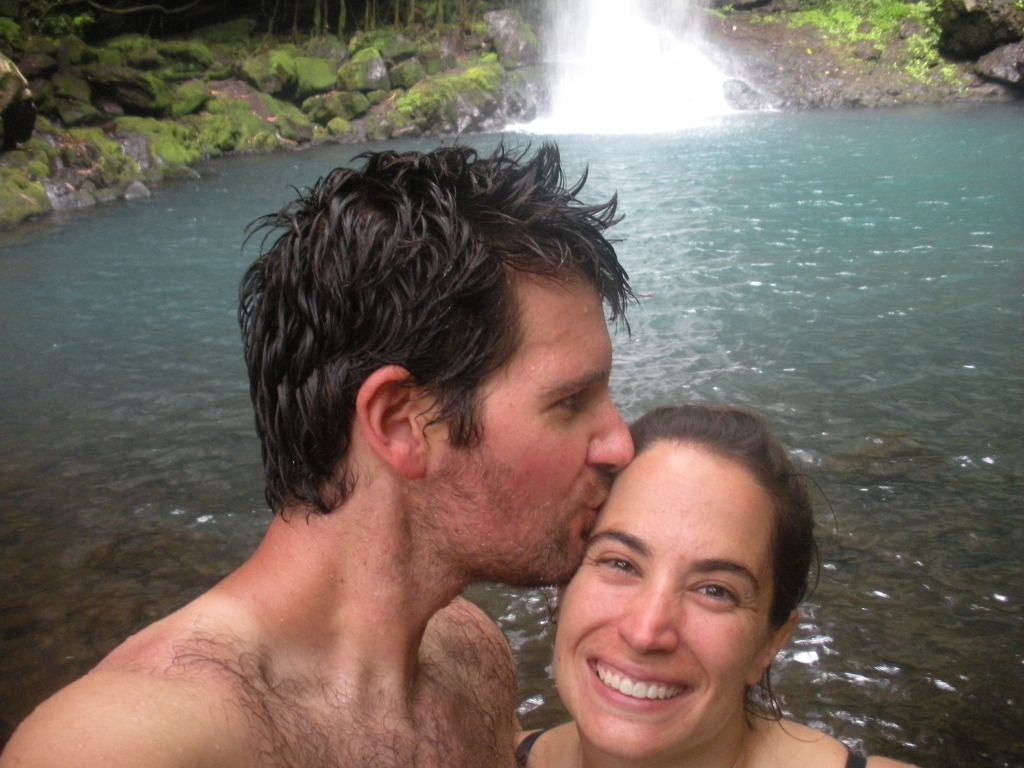
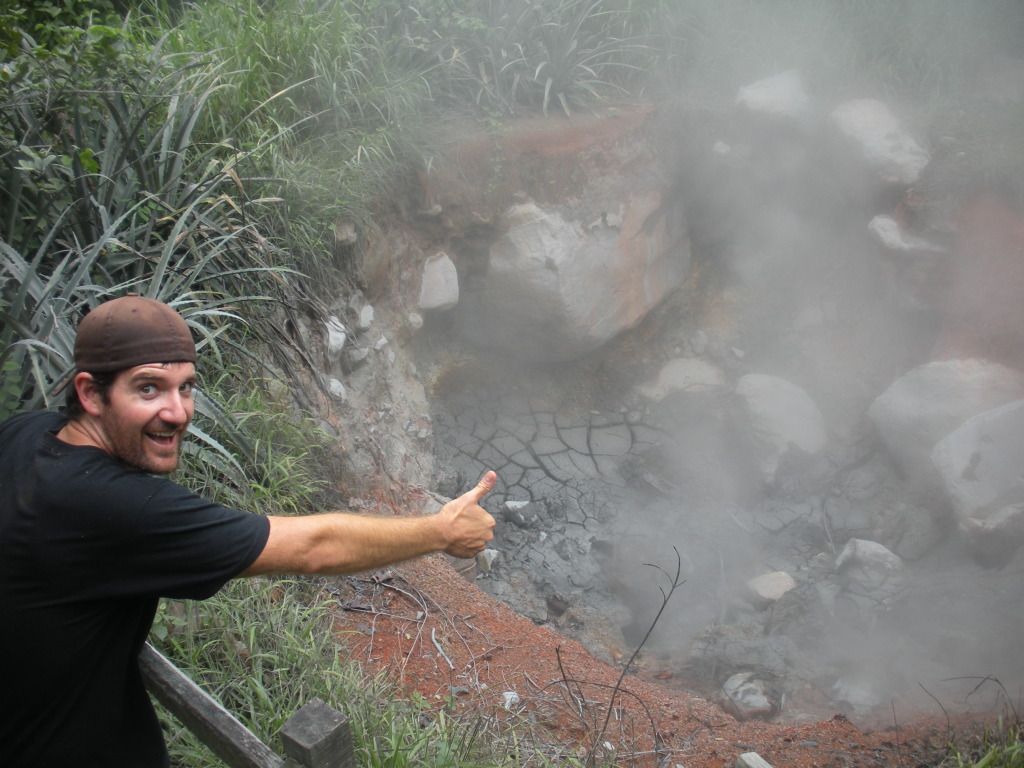
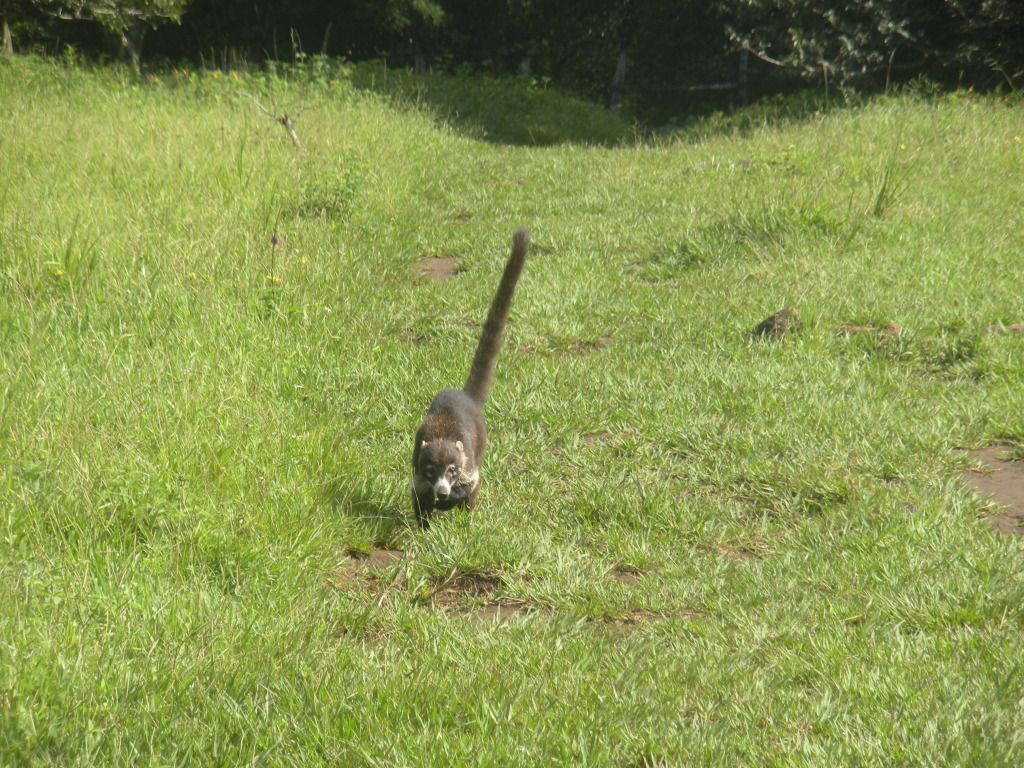
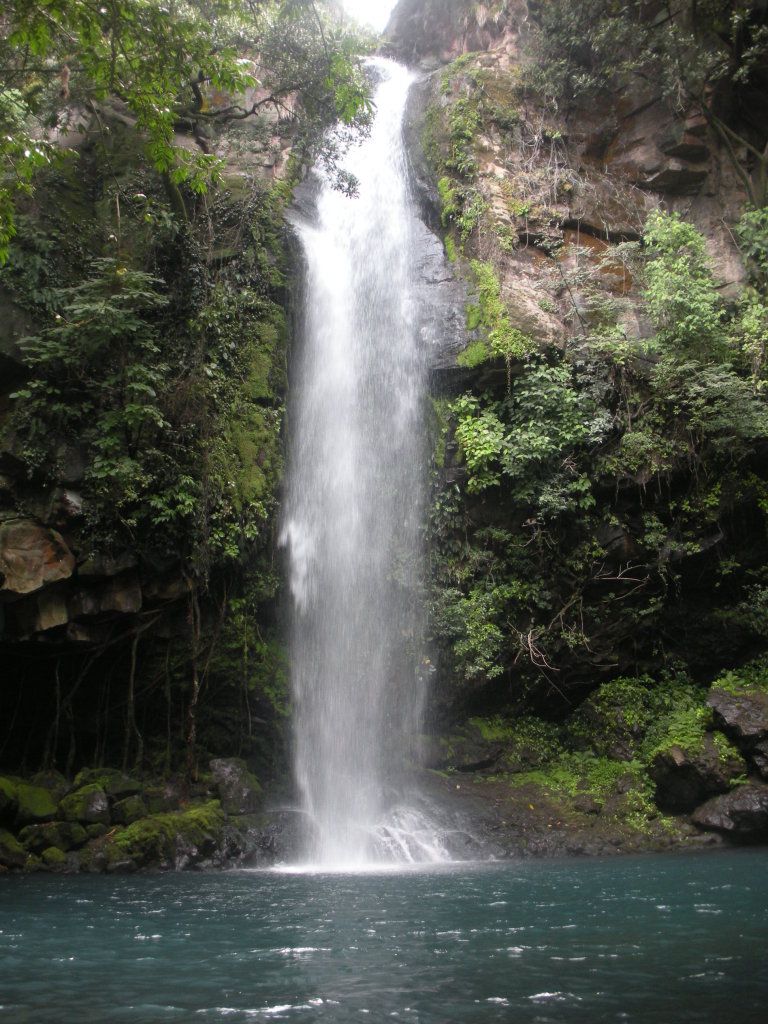
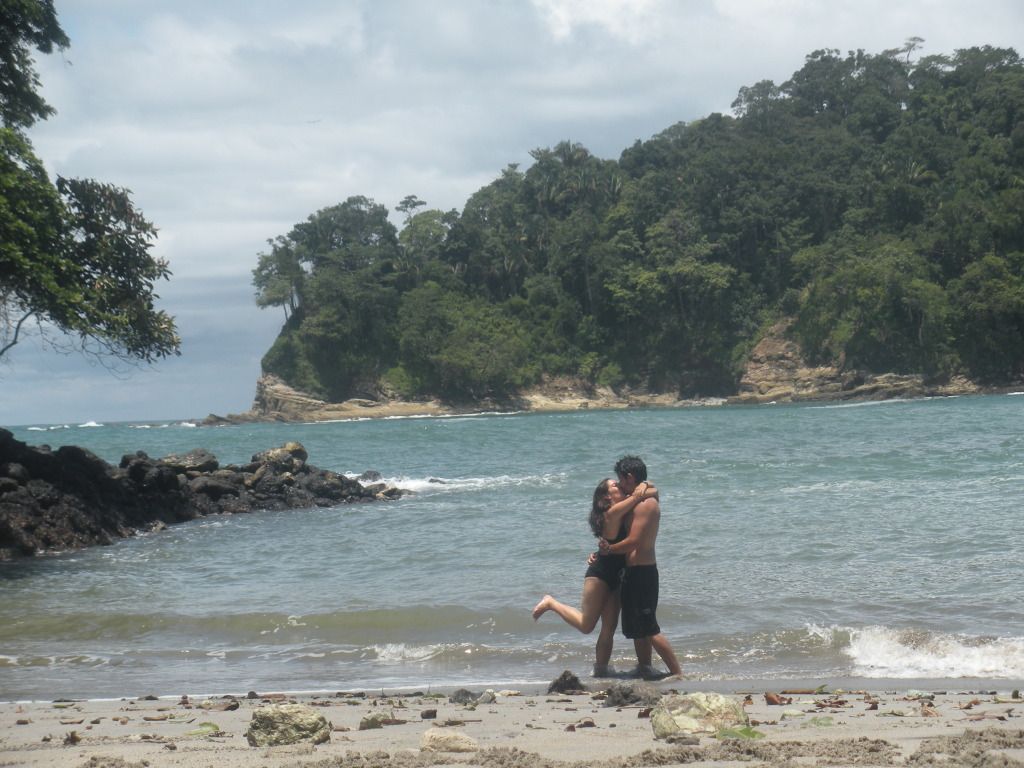
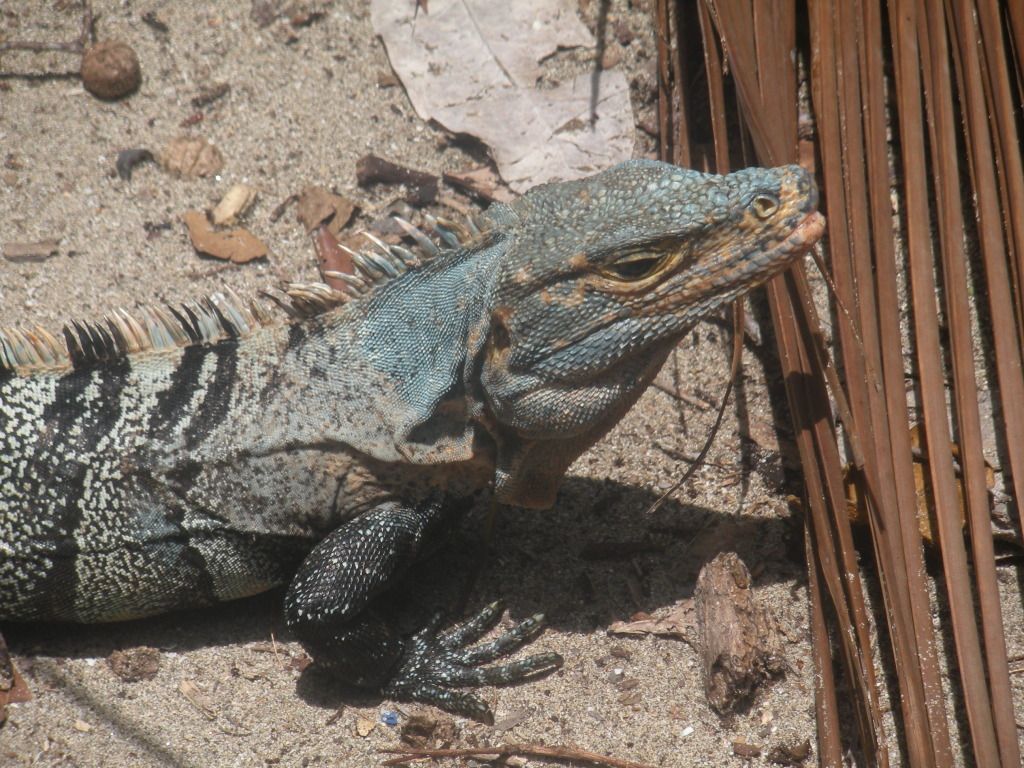
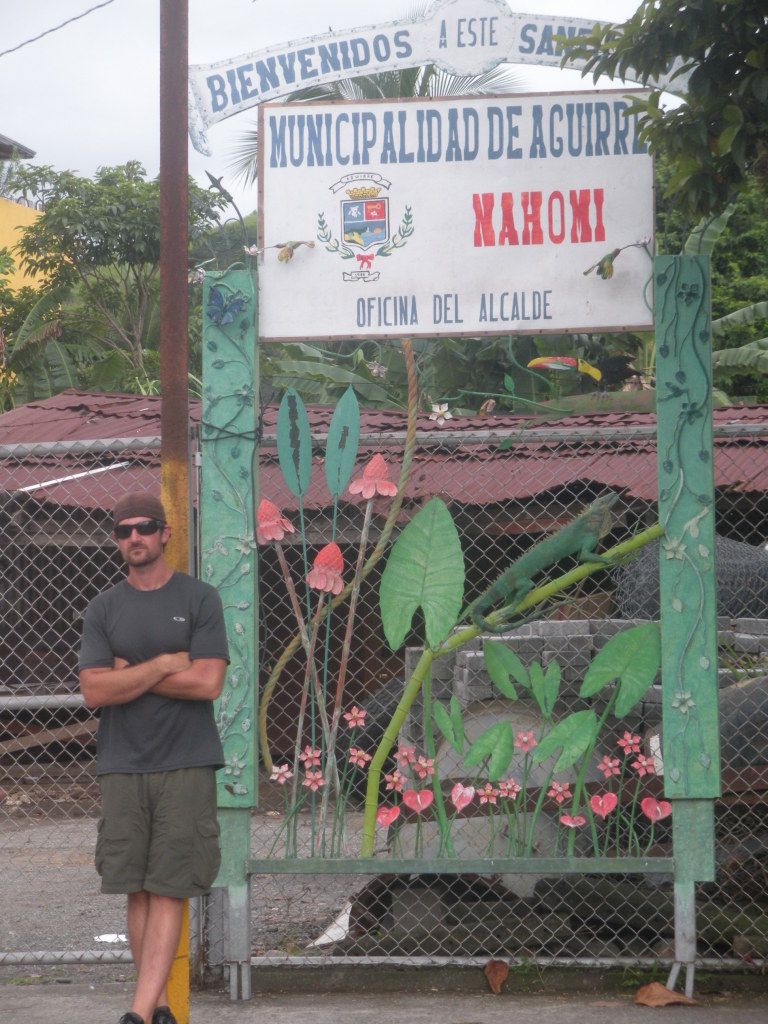
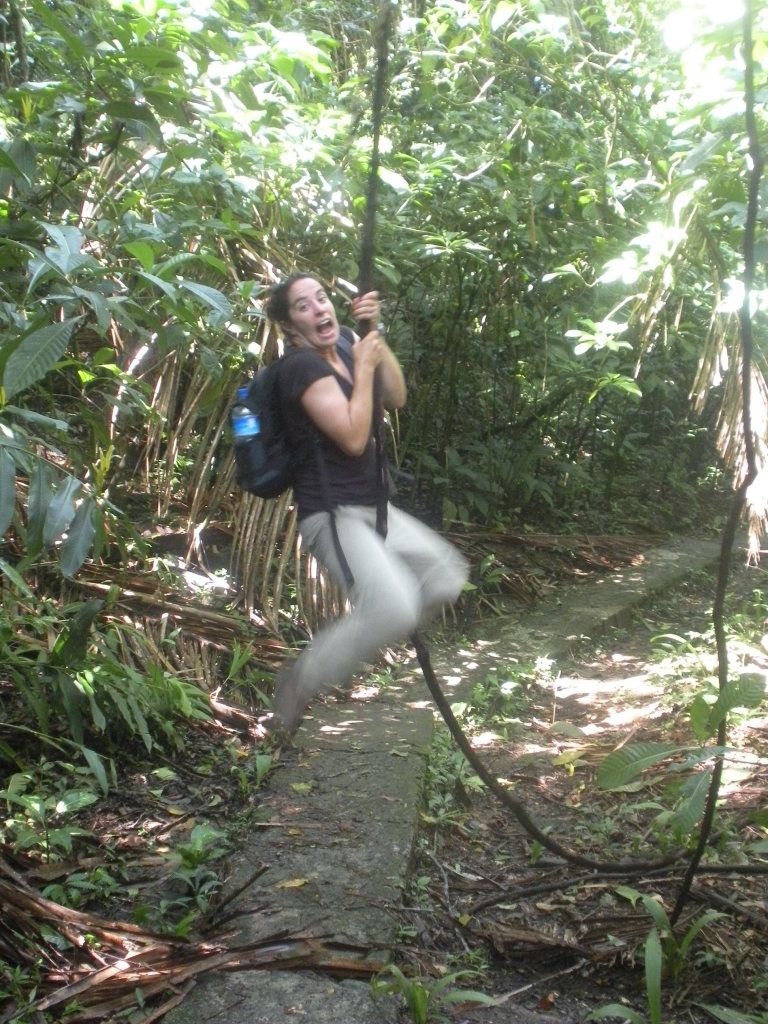
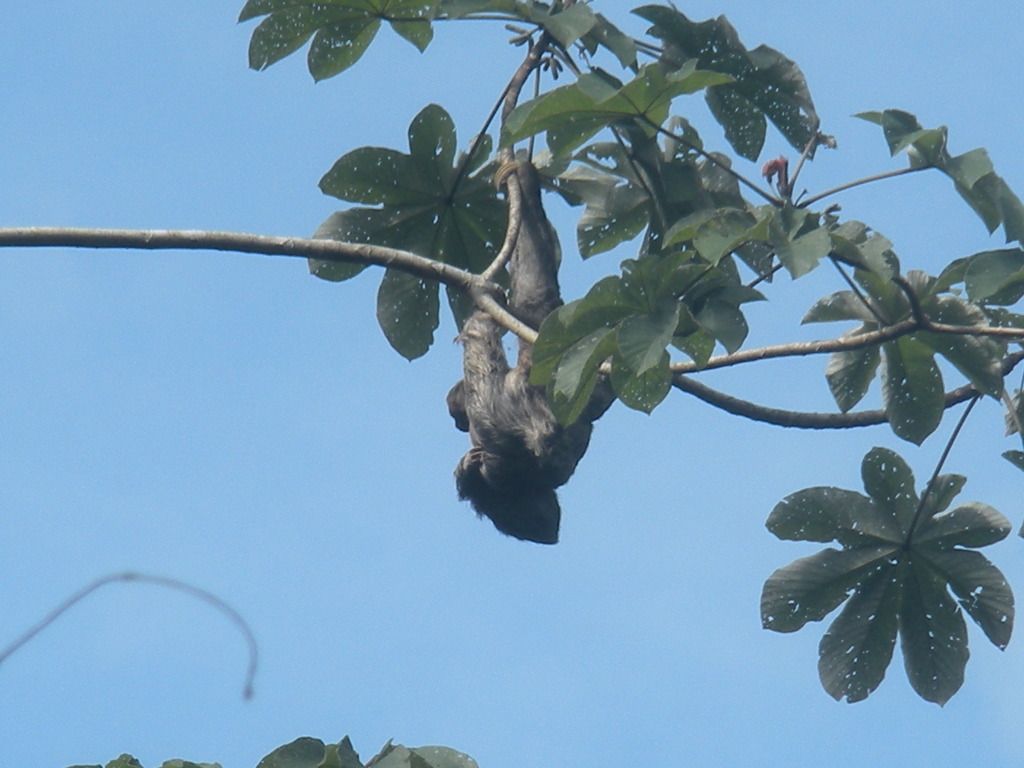
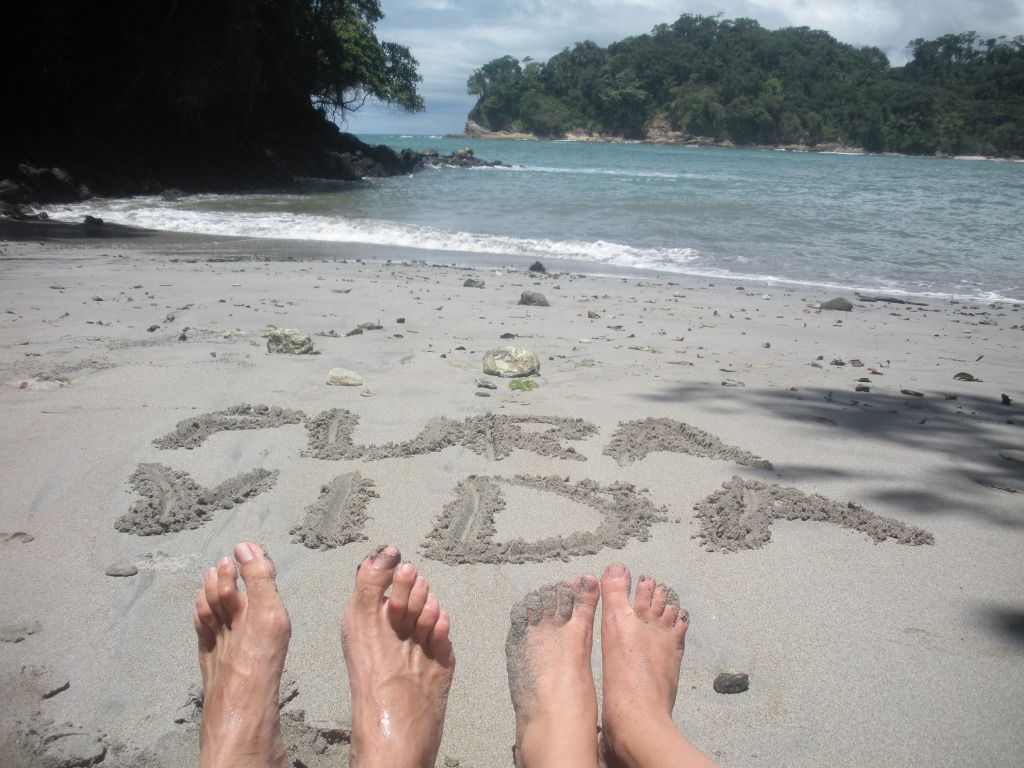
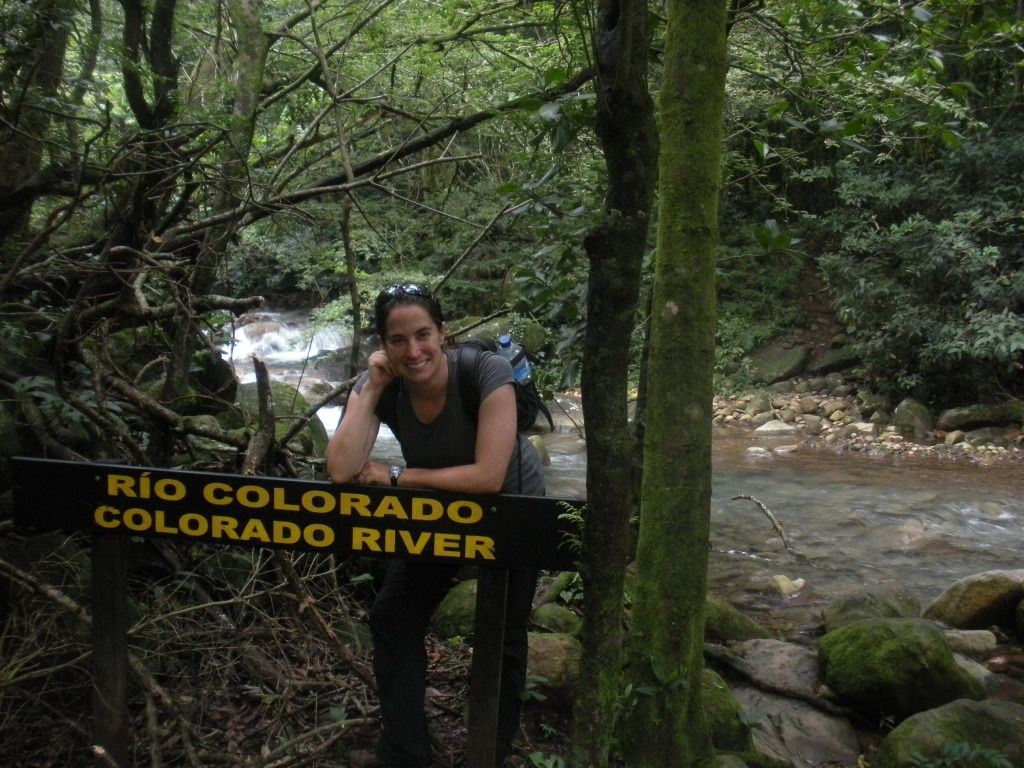
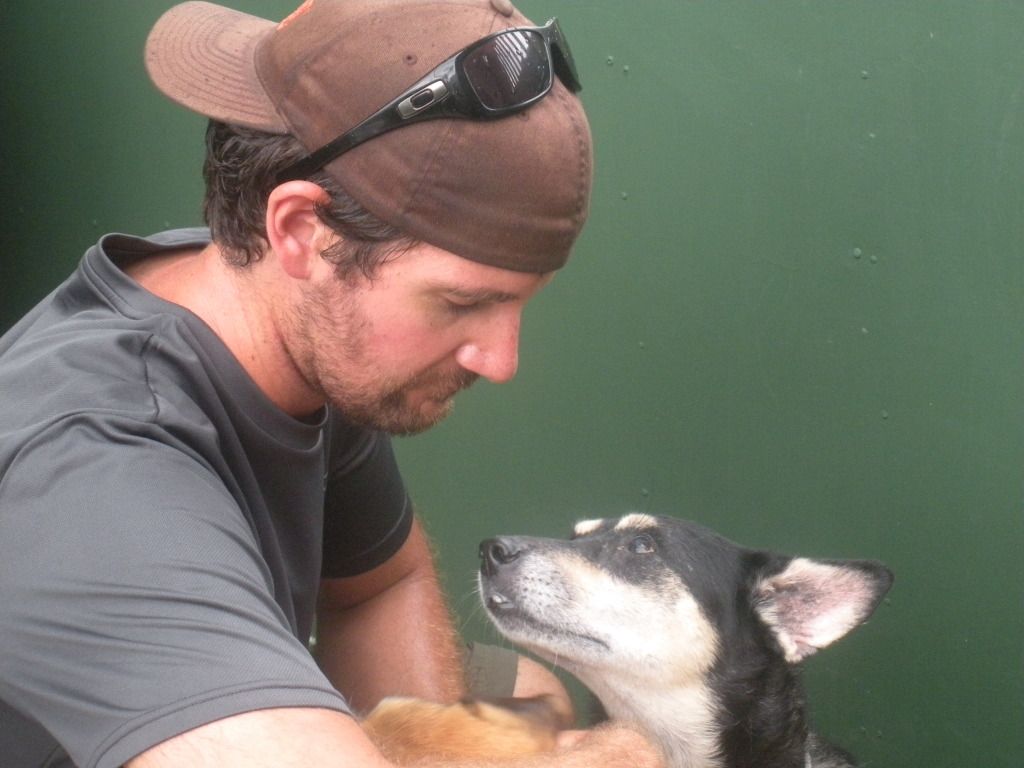
Comments
Post a Comment